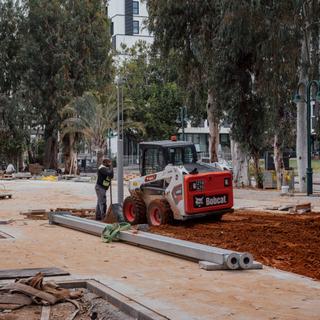


Israeli contractors face the dilemma of the Palestinian workforce
NewsFollowing the attack on October 7, the cancellation of permits allowing 200,000 workers from the West Bank to enter Israeli territory every day plunged the construction sector into crisis.
High above the saturated freeway, with its bumper-to-bumper traffic, the unfinished interchange seems to hang in the air, like an unfulfilled promise of smooth traffic flow. Giant chunks of deck are missing, some 20 meters above the ground, rendering this motorway junction on the outskirts of Tel Aviv unusable. Beyond the traffic jam, the city can be seen in the distance, with its towers often surrounded by stationary cranes. Everywhere, infrastructure sites appear to be frozen, for lack of workers to complete them. This is one of the effects of the war between Israel and Hamas, whose economic repercussions are profound.

The Palestinian workers who built the road network and erected buildings in Israel did not simply disappear on October 7, 2023. Their permits were collectively cancelled. Of the 200,000 residents of the occupied territories authorized to work in Israel before the war, 80,000 were employed in the construction sector. In mid-March, a report by the established that over 300,000 jobs – in all sectors – had been lost in the West Bank since October 7. Direct consequences of this include a loss of earnings of $25.5 million a day (€23.5 billion) and an unemployment rate expected to reach 42.7% at the end of March. Hativ Morad, a Palestinian entrepreneur in Israel, feels sorry for his ex-employees in the West Bank: "There were 60 of us in total in the company, now there are only six, including my three children. All these employees get nothing, and they have no savings. Their situation is terrible."

In the center of Tel Aviv, on the 11th floor of the Migdal Shalom tower – the city's first, built in 1965 – Raul Srugo, the president of the Israel Builders Association, tallies up this disaster, contractor-wise. Construction accounts for 6.2% of Israel's gross national product, and contributes nearly 20% to the taxes collected by the state, generating a loss of tax revenue since October 7 that he estimates at €10 billion. Around half of the country's construction sites are at a standstill. The remainder are operating at low capacity. The West Bank's 80,000 workers are traditionally in charge of structural work in the building industry. The finishing touches, in a subdivision of work with unwritten rules, are the responsibility of Palestinians in Israel.
'Dangerous illusion'
Some of the 25,000 migrant workers present in Israel before October 7 have left the country. Some have returned, but not in sufficient numbers to ensure the continuity of the work. "China doesn't want its workers to return to Israel, because they're on the other side, with Russia and Iran. So we're trying to bring in Indians at the moment," said Srugo. Behind this crisis situation lies a deeper crisis than that revealed by the macroeconomic statistics. A part of public opinion is viscerally opposed to the return of Palestinian workers to the cities. And some entrepreneurs are trying to imagine a post-war world without this workforce.
You have 61.48% of this article left to read. The rest is for subscribers only.
